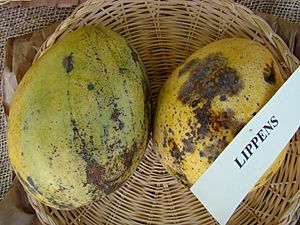Lippens (mango) facts for kids
Quick facts for kids Mangifera 'Lippens' |
|
|---|---|

Display of 'Lippens' mango at the Redland Summer Fruit Festival, Fruit and Spice Park, Homestead, Florida
|
|
| Genus | Mangifera |
| Species | Mangifera indica |
| Hybrid parentage | 'Haden' × unknown |
| Cultivar | 'Lippens' |
| Origin | Florida, USA |
The Lippens' mango is a special type of mango. It's known as a 'cultivar', which means it's a specific kind of plant grown for its unique features. This tasty mango first grew in sunny south Florida.
History of the 'Lippens' Mango
The very first 'Lippens' mango tree started from a seed. This seed came from a 'Haden' mango. It was planted in 1931 by Peter and Irene Lippens at their home in Miami, Florida. The tree grew well and produced its first fruit in 1938. People started growing and selling 'Lippens' mango trees in 1945. Later studies showed that 'Lippens' was indeed a child plant of the 'Haden' mango.
In 1947, the Florida Mango Forum described the 'Lippens' mango. They noted it had great taste and produced many fruits. It was also good at resisting diseases. Because of these qualities, people thought it would be a very popular mango to grow and sell. Even though it wasn't grown on huge farms, people could buy 'Lippens' trees for their own gardens in Florida. The 'Lippens' mango is also a parent to other famous Florida mangoes. These include 'Irwin', 'Jewel', and 'Golden Lippens'.
You can find 'Lippens' mango trees in special plant collections. These include the USDA's germplasm repository in Miami, Florida. There are also trees at the University of Florida's Tropical Research and Education Center in Homestead, Florida. Another place is the Miami–Dade Fruit and Spice Park, also in Homestead. These places help keep different types of plants safe for the future.
What Does a 'Lippens' Mango Look Like?
A 'Lippens' mango fruit is usually oval or slightly long. It weighs about one pound when it's ready to eat. The top part is round and doesn't have a pointy tip. When the fruit is ripe, its skin turns yellow. It also gets a pretty pink or red blush.
Inside, the flesh of the mango is a deep yellow color. It tastes very sweet and doesn't have stringy fibers. The seed inside is called 'monoembryonic'. This means it usually grows only one plant from each seed. 'Lippens' mangoes are typically ready to pick in Florida from late June to July.
The 'Lippens' mango trees grow strongly and reach a medium size. They have a compact and thick canopy of leaves.
 | Kyle Baker |
 | Joseph Yoakum |
 | Laura Wheeler Waring |
 | Henry Ossawa Tanner |

